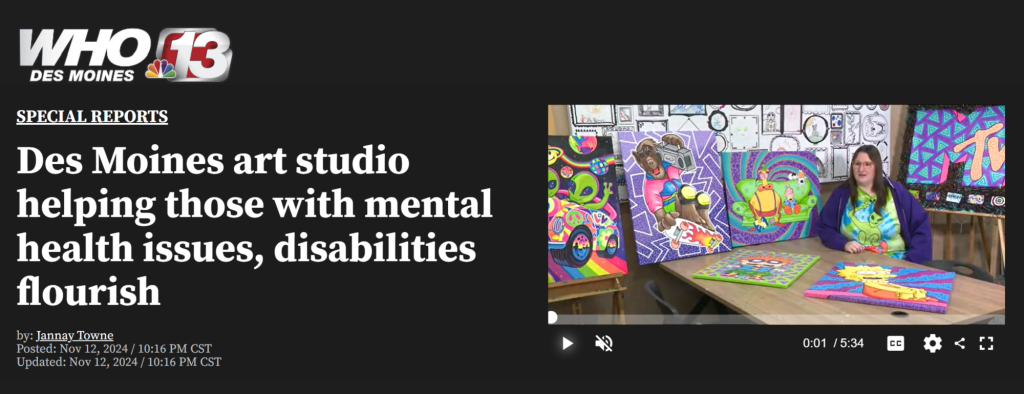WHO13: Des Moines art studio helping those with mental health issues, disabilities flourish

DES MOINES, Iowa — Des Moines’ art scene is gaining momentum with a program that supports artists with disabilities and mental health conditions.
In the heart of the city, you’ll find a creative workspace like no other, showcasing hundreds of local and up-and-coming artists.
Mainframe Studios is the largest non-profit art studio space in the country. Inside the eye-catching building on Keo Way, one studio is drawing artists of all talents and walks of life.
“I never went to art school, I don’t understand composition, light theory, terms for anything,” said Katie Gazzo.
That didn’t stop Gazzo from taking a giant leap of faith. A few years ago, she quit her job as a tattoo artist to pursue her expressionist-style full time.
“I just grab things, you know, whatever I’m feeling. Very intuitive would like be a good word for it too,” said Gazzo.
“I really did figure out my own style based on what I wanted to look at. I’m definitely a maximalist,” described Abby Niederhauser.
From MTV to the Simpsons and the loveable alien Alf, Niederhauser paints it all in great detail.
“I am a 90s-decade focused pop artist,” said Niederhauser.
Despite their two very different styles, both artists found a home at Momentum.
“We are an organization that supports artists with disabilities and mental health conditions,” said Momentum Program Director Kelsey Burr.
Burr says the studio door is always open no matter your artistic ability.
“It’s really the creation process and how it’s healing, and it can connect you with people and it can connect you with your own feelings,” explained Burr.
Gazzo’s award-winning art is helping her heal from something you can’t see. The trauma from her childhood of growing up in foster care.
“I have a tendency because of my anxiety to kind of feel like – yeah I just want to hold onto things really tightly because I’m scared to lose it,” she told us while painting her latest piece.
For Niederhauser, she let’s her art do the talking when words fail her.
“I do not know how to start conversations out in the real world,” explained Niederhauser.
She tells us she has spent a lifetime hiding or what she calls “masking” her autism.
“Masking to me means I need to pay attention to every facet of everything I am doing. I have to pay attention to where my hands are, I have to pay attention to my facial expression. I have to make sure other people are talking in the conversation and I have to think of all of this while I’m having the conversation.”
At Momentum, the mask comes off.
“I think that art is transformative. I’ve seen it be transformative,” said Burr.
“Being able to express yourself in a way that’s not verbal, it really allows people get their emotions and feelings out in a different way that maybe is a little easier than to have to verbally say them,” explained Burr.
